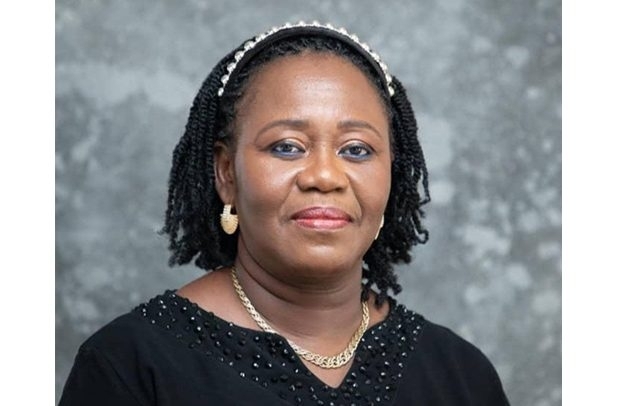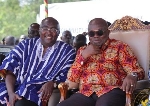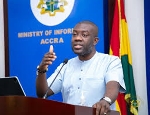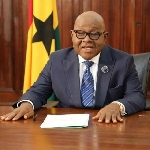Full text of petitions against CJ and her responses
 Getrude Torkornoo, suspended Chief Justice
Getrude Torkornoo, suspended Chief Justice
Petition by Daniel Ofori
According to the petition of Daniel Ofori, first, “In 2023, the Honourable Chief Justice misappropriated the sum of GHS 261, 890.00 of public funds for the benefit of the Chief Justice for her private foreign travel with her husband, Mr Francis Kofi Torkornoo, and her daughter Miss Edem S.A. Torkornoo and US$30,000 in per diem allowance when, to her knowledge, neither the husband of the Chief Justice nor the Chief Justice’s daughter were entitled to have their travel or any travel allowances paid for out of the funds of the Judicial Service.
Second, “In 2023, the Honourable Chief Justice misappropriated GHS75,580.00 from public funds to purchase Ethiopian Airlines tickets for the Honourable Chief Justice and her husband during Her Ladyship’s vacation to Arusha, Tanzania.
Third, “In 2023, Her Ladyship the Honourable Chief Justice obtained from the Judicial Service an accountable imprest in the sum of $14,000.00 to the Honourable Chief Justice to travel with her husband to Arusha, Tanzania, which she failed to retire.
There are 18 other allegations in Daniel Ofori’s petition
CJ Response to Daniel Ofori
The Chief Justice, in her response to the first three of the 21 accusations by Daniel Ofori, responded as follows: “The petitioner alleges that as Chief Justice, I misappropriated the sum of Gh¢261, 890.00 of public funds for my private foreign travel with her husband Mr Francis Torkornoo and my daughter Miss Edem Torkornoo when according to him, neither person was entitled to have their travel paid for out of the funds of the Judicial Service of Ghana.
“My humble response is that the allegation is an unfortunate untruth.
Please find herewith the following evidence.
Paragraph B1 of the “POLICY ON FOREIGN TRAVELS BY HEAD OF THE JUDICIARY AND SUPERIOR COURT JUDGES,” provides for two holidays for the Chief Justice in a year, with travel expenses, hotel accommodation, and per diem to be borne by the Judicial Service and capped at 14 days per round trip.
Paragraph A (9) provides that “The Chief Justice shall undertake unlimited official travels with either his/her Spouse or other person of his/her choice in a year, fully funded by the Judicial Service.”
Paragraph A (10) provides that “Where the Spouse or other person accompanies the Chief Justice, he/she shall travel on the same class of air ticket as the Chief Justice and shall be paid the equivalent of half the per diem paid to the Chief Justice.”“This has been the policy of the Judicial Service since 2010, as amended in 2019.
Exhibit DO (4) is a response to the audit observation provided by the Judicial Secretary to auditors who sought clarification on the expenditure on the ticket purchased for my husband and daughter during my two holidays in 2023.
“On page 1 of Exhibit DO 4, the Judicial Secretary clarified that, as Chief Justice, I opted to utilize the authorization in paragraphs 9 and 10 of the Travel Policy to travel with my spouse and my daughter during my two holidays in September 2023—pursuant to the conditions of appointment of the Chief Justice.
“In view of this option, there was no infraction occasioned when I opted to travel for my two holidays with my spouse on one occasion and my daughter on the second occasion.
The Response to Observation 1 and Response to Observation 2 of exhibit DO4 provides an explanation of the expenditure on tickets for my husband and daughter that the petitioner has unfortunately described as misappropriation of public funds by the Chief Justice
The Chief Justice Getrude Araba Esaaba Sackey Torkornoo, has been suspended from office by President John Dramani Mahama, effective Tuesday, 22 April 2025.
The President’s actions, which are said to be grounded in Article 146 (10) of the 1992 constitution, were largely inspired by some three petitions that the President received seeking the removal of the Chief Justice from office.
Read the petition and responses by the CJ to the petition by AYAMGA YAKUBU AKOLGO.
Ayamga Akolgo’s Petition
The third petition by the senior police officer, Ayamga Akolgo, among others, states, “This is my respectful petition made in good faith to ensure judicial accountability.
The Chief Justice is equal before the law. She is accountable for omissions arising from the exercise of judicial office.
“The prescribed procedure towards judges’ accountability is provided in article 146 of the Constitution, section 16 of the Judicial Service Act, and the Code of Conduct for Judges and Magistrates, Ghana.
“I did nothing criminal to be arrested and detained on her orders.
I did not commit contempt of court. She made demeaning comments specifically directed at my person.
I did respond, disagreeing with her demeaning comments.
Suddenly, she furiously and unilaterally orders my arrest and detention for disagreeing with her demeaning comments.
“She abuses the sacred judicial office by wrongly causing my arrest and detention.
The arrest and detention were capricious, unreasonable, unilateral, and without justification, constituting stated misbehaviour and incompetence as provided in Article 146 (1) of the Constitution.
The arrest and detention infringed on my rights, dignity, and resulted in pain, trauma, and humiliation.
“She failed or neglected to perform her judicial duty of recording the occurrence in the court’s record book. She authorised, supervised, and approved false statements or false entries in the search report.
“The supervision of false statements in the search was intended to deceive, cover up, obstruct, or pervert the course of justice, or constitute criminal fabrication of evidence, contrary to statutes, the Code of Conduct for Judges, and consistent with stated misbehaviour and incompetence as provided in Article 146 (1) of the Constitution,” Ayamga Akolgo alleged in his petition.
CJ response to Ayamga
“Your Excellency, while I do not hesitate to apologize on behalf of the Supreme Court and myself if any court user, including the Petitioner, had a bad experience in court while I was presiding over a case, my humble submission is that the Petition does not provide any element of ‘misbehaviour or incompetence that can lead to removal of a Chief Justice under the 1992 Constitution.“The hearing and proceedings complained about are the proceedings of the Supreme Court.
The Supreme Court is always composed of not less than five Justices for the exercise of its judicial functions under Article 128 of the 1992 Constitution, except when its work is executed by a single Justice under Article 134.In the conduct of the work of the Supreme Court, the presiding Judge, whether the Chief Justice or another senior member of the court, is not the court.
And any directions given during the court’s work are the directions of the court, and not the directions of any individual judge.
“As stated by the Petitioner, other members of the court gave various directions and contributions during the proceedings of the day.
All those directions and contributions formed part of the work of the court that day.
“Article 127 on Independence of the Judiciary provides: 127 (3) A Justice of a Superior Court, or any person exercising judicial power, shall not be liable to any action or suit for any act or omission by him in the exercise of the judicial power.
The Chief Justice Getrude Araba Esaaba Sackey Torkornoo, has been suspended from office by President John Dramani Mahama, effective Tuesday, 22 April 2025.
The President’s actions, which are said to be grounded in Article 146 (10) of the 1992 constitution, were largely inspired by some three petitions that the President received seeking the removal of the Chief Justice from office.
Read the petition and responses by the CJ to the petition by AYAMGA YAKUBU AKOLGO.
Ayamga Akolgo’s Petition
The third petition by the senior police officer, Ayamga Akolgo, among others, states, “This is my respectful petition made in good faith to ensure judicial accountability. The Chief Justice is equal before the law. She is accountable for omissions arising from the exercise of judicial office.
“The prescribed procedure towards judges’ accountability is provided in article 146 of the Constitution, section 16 of the Judicial Service Act, and the Code of Conduct for Judges and Magistrates, Ghana.
“I did nothing criminal to be arrested and detained on her orders. I did not commit contempt of court. She made demeaning comments specifically directed at my person. I did respond, disagreeing with her demeaning comments. Suddenly, she furiously and unilaterally orders my arrest and detention for disagreeing with her demeaning comments.
“She abuses the sacred judicial office by wrongly causing my arrest and detention. The arrest and detention were capricious, unreasonable, unilateral, and without justification, constituting stated misbehavior and incompetence as provided in Article 146 (1) of the Constitution. The arrest and detention infringed on my rights, dignity, and resulted in pain, trauma, and humiliation.
“She failed or neglected to perform her judicial duty of recording the occurrence in the court’s record book. She authorized, supervised, and approved false statements or false entries in the search report.
“The supervision of false statements in the search was intended to deceive, cover up, obstruct, or pervert the course of justice, or constitute criminal fabrication of evidence, contrary to statutes, the Code of Conduct for Judges, and consistent with stated misbehavior and incompetence as provided in Article 146 (1) of the Constitution,” Ayamga Akolgo alleged in his petition.
CJ response to Ayamga
“Your Excellency, while I do not hesitate to apologize on behalf of the Supreme Court and myself if any court user, including the Petitioner, had a bad experience in court while I was presiding over a case, my humble submission is that the Petition does not provide any element of ‘misbehavior or incompetence that can lead to removal of a Chief Justice under the 1992 Constitution.
“The hearing and proceedings complained about are the proceedings of the Supreme Court. The Supreme Court is always composed of not less than five Justices for the exercise of its judicial functions under Article 128 of the 1992 Constitution, except when its work is executed by a single Justice under Article 134.In the conduct of the work of the Supreme Court, the presiding Judge, whether the Chief Justice or another senior member of the court, is not the court. And any directions given during the court’s work are the directions of the court, and not the directions of any individual judge.
“As stated by the Petitioner, other members of the court gave various directions and contributions during the proceedings of the day.
All those directions and contributions formed part of the work of the court that day.
“Article 127 on Independence of the Judiciary provides: 127 (3) A Justice of a Superior Court, or any person exercising judicial power, shall not be liable to any action or suit for any act or omission by him in the exercise of the judicial power.
Source: Classfmonline.com
Trending News

Join me on the ‘Thank You Tour’ – Bawumia to NPP leaders
18:24
Minority slams Mahama administration over mining sector decisions
10:22
NPP’s decision not to release Oquaye’s report to shield actors of 2024 defeat-Asante Okyere
01:45
Bawumia commends Oquaye committee's insightful report
14:34
Gideon Boako begins community stakeholder engagements in Tano North
08:13
GA/R: Weija-Gbawe MP raises alarm over prolonged power outages in constituency
01:17
I'm happy with the Mike Oquaye report - Bawumia to NPP
16:26
Clergy love for wealth and politics dimming Easter spirit- Prophet
04:33
Dumsor in Kumasi and surroundings caused by illegal lumbering – GRIDCo
05:00
Full text of petitions against CJ and her responses
14:15




